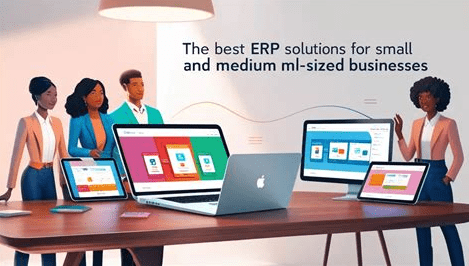Erp solutions small business
Welcome to our article on effective ERP solutions for small businesses! Implementing an Enterprise Resource Planning (ERP) system can greatly improve efficiency and streamline operations for companies of all sizes, including small businesses. By automating processes, managing resources, and providing real-time insights into business operations, ERP solutions can help small businesses compete in today’s fast-paced market. In this article, we will explore some of the best ERP solutions tailored for small businesses, so you can make an informed decision for your company’s success.
Key Benefits of ERP Solutions for Small Businesses
Implementing an ERP solution for a small business can bring a multitude of benefits that will streamline operations, improve efficiency, and ultimately increase profitability. Here are some key benefits of using ERP solutions for small businesses:
Centralized Data Storage: One of the greatest advantages of an ERP system is the ability to store all business data in one central location. This means that all departments within the business can access the same up-to-date information, eliminating the need for manual data entry and reducing the risk of errors. With centralized data storage, small businesses can make more informed decisions based on real-time data, leading to better overall business performance.
Improved Efficiency: ERP solutions automate many manual processes, such as data entry and reporting, which can save small businesses valuable time and resources. By streamlining workflows and reducing the need for repetitive tasks, employees can focus on more strategic activities that drive business growth. This increased efficiency leads to cost savings and allows small businesses to operate more competitively in the market.
Enhanced Customer Relationship Management: Small businesses can greatly benefit from ERP solutions when it comes to managing customer relationships. With a centralized database that tracks customer interactions and preferences, businesses can provide personalized service and tailored marketing campaigns. This level of customer relationship management can lead to increased customer loyalty, satisfaction, and retention, ultimately resulting in higher revenue for the business.
Scalability: As small businesses grow and expand, they need systems in place that can scale along with them. ERP solutions are designed to be scalable, allowing businesses to add new users, functionalities, and modules as needed. This flexibility ensures that small businesses can continue to use their ERP system effectively, even as they evolve and grow over time.
Cost Savings: While implementing an ERP solution may require an initial investment, the long-term cost savings can be significant for small businesses. By automating processes and reducing the need for manual labor, businesses can save on operational costs and increase overall efficiency. Additionally, by having all business data in one centralized location, small businesses can avoid costly errors and redundancies that can arise from using multiple disconnected systems.
Compliance and Security: Small businesses face increasing regulatory requirements and data security concerns, making it crucial to have systems in place that can ensure compliance and protect sensitive information. ERP solutions offer built-in security features and compliance tools that help small businesses meet regulatory standards and safeguard their data. By using an ERP system, small businesses can reduce the risk of data breaches and non-compliance penalties, giving them peace of mind and ensuring the integrity of their business operations.
Overall, ERP solutions provide small businesses with the tools they need to streamline operations, improve efficiency, and drive growth. By centralizing data, automating processes, enhancing customer relationships, scaling effectively, saving costs, and ensuring compliance and security, small businesses can benefit greatly from implementing an ERP solution.
Choosing the Right ERP Solution for Your Small Business
Implementing an ERP solution for your small business can streamline your operations, improve efficiency, and ultimately save you time and money. However, with so many ERP solutions on the market, choosing the right one for your specific needs can be a daunting task. Here are some key factors to consider when evaluating ERP options for your small business:
1. Define Your Requirements:
Before you start looking at different ERP solutions, take the time to clearly define your business requirements. Consider what functionalities are essential for your operations, what processes you want to improve, and what goals you aim to achieve with an ERP system. The more specific you are about your needs, the easier it will be to narrow down your options and find a solution that aligns with your business objectives.
2. Consider Scalability:
While your small business may have limited needs right now, it’s important to think about the future growth of your company. Look for an ERP solution that is scalable and can grow with your business. This means considering factors such as the number of users the system can support, the amount of data it can handle, and the flexibility to add modules or features as your business expands. Choosing a scalable ERP solution will save you from having to switch systems down the line as your business grows.
3. Evaluate Integration Capabilities:
Chances are, your small business already uses a variety of software applications to manage different aspects of your operations. When choosing an ERP solution, it’s crucial to consider its integration capabilities with your existing systems. Look for an ERP system that can easily integrate with other software applications you use, such as accounting software, CRM systems, or e-commerce platforms. Seamless integration will enable data to flow smoothly between systems, eliminating the need for manual data entry and improving overall efficiency.
4. Assess Customization Options:
Every small business is unique, and your ERP solution should be able to adapt to your specific requirements. Consider the customization options offered by different ERP vendors and assess whether they can tailor the system to meet your company’s specific needs. Customization may include configuring workflows, creating custom reports, or adding unique functionalities that align with your business processes. Having a customizable ERP solution will ensure that the system works for your business, not the other way around.
5. Think About User-Friendliness:
One of the key factors in successful ERP implementation is user adoption. If your employees find the system difficult to use or understand, they may resist using it, ultimately undermining the benefits of the ERP solution. When evaluating ERP options, consider the user-friendliness of the system. Look for intuitive interfaces, easy navigation, and comprehensive training and support resources to help your employees become comfortable with the new system. A user-friendly ERP solution will increase adoption rates and maximize the return on your investment.
By considering these key factors when choosing an ERP solution for your small business, you can ensure that you select a system that meets your needs, fits your budget, and supports the growth of your company. Take the time to research different options, request demos, and involve key stakeholders in the decision-making process to make an informed choice that will benefit your business in the long run.
Implementing ERP Solutions in a Small Business Environment
Implementing ERP solutions in a small business environment may seem like a daunting task, but with the right planning and strategy, it can be a smooth transition. Here are some key steps to consider when implementing ERP solutions in a small business:
1. Assess Your Business Needs: Before diving into the world of ERP solutions, it’s important to assess your business needs. What are the pain points in your current processes that need to be addressed? What are the goals you want to achieve with an ERP system? By understanding your business needs, you can better choose an ERP solution that aligns with your requirements.
2. Choose the Right ERP Solution: Once you have a clear understanding of your business needs, it’s time to choose the right ERP solution for your small business. There are many ERP vendors out there, each offering different features and functionalities. Consider factors such as scalability, ease of use, customization options, and cost when selecting an ERP system that best fits your business.
3. Develop a Implementation Plan:
Developing a comprehensive implementation plan is crucial for the successful deployment of an ERP solution in a small business environment. This plan should outline the timeline, resources, milestones, and key stakeholders involved in the implementation process. It’s important to break down the implementation plan into manageable tasks and set realistic deadlines to ensure a smooth transition.
Start by creating a project team that will be responsible for overseeing the implementation process. This team should include key stakeholders from different departments in your organization to ensure that all aspects of the business are considered during the implementation. Assigning clear roles and responsibilities to team members will help streamline the process and prevent any confusion or delays.
Next, conduct a thorough data analysis to understand the current state of your business data and processes. This will help you identify any gaps or inconsistencies that need to be addressed before implementing the ERP solution. Clean and organize your data to ensure a smooth migration to the new system.
Training is also a crucial part of the implementation plan. Make sure to provide comprehensive training to your employees to ensure they are comfortable using the new ERP system. This will help maximize user adoption and minimize resistance to change within your organization.
Finally, monitor and evaluate the progress of the implementation plan regularly. Keep track of key performance indicators and metrics to ensure that the ERP solution is meeting your business goals. Make adjustments to the plan as needed to address any issues or challenges that arise during the implementation process.
By following these steps and developing a solid implementation plan, you can successfully implement an ERP solution in a small business environment. With the right strategy and approach, an ERP system can help streamline your business processes, improve efficiency, and drive growth for your small business.
Overcoming Common Challenges in Adopting ERP Solutions for Small Businesses
Implementing an ERP solution for a small business can be a game-changer, but it does come with its own set of challenges. Here are some common hurdles small businesses face when adopting ERP solutions and how to overcome them:
1. Cost: One of the biggest challenges for small businesses when it comes to implementing ERP solutions is the cost. ERP systems can be expensive to purchase, install, and maintain. However, there are ways to mitigate these costs. One option is to opt for a cloud-based ERP solution, which can be more cost-effective than traditional on-premise systems. Small businesses can also look for vendors that offer flexible payment plans or financing options to help spread out the costs over time.
2. Resistance to Change: Another common challenge small businesses face when implementing ERP solutions is resistance to change. Employees may be comfortable with their current processes and reluctant to learn new systems. To overcome this hurdle, it is essential to involve employees in the implementation process from the beginning. Providing proper training and support can help employees feel more comfortable with the new ERP system and increase their willingness to adapt to the changes.
3. Integration with Existing Systems: Small businesses often have limited IT resources, which can make integrating an ERP solution with existing systems a challenge. To overcome this obstacle, it is crucial to choose an ERP system that offers easy integration capabilities or pre-built connectors for popular platforms. Working closely with IT professionals or consulting with an external IT service provider can also help ensure a smooth integration process.
4. Lack of Customization: One of the common challenges small businesses face when implementing ERP solutions is the lack of customization options. Many off-the-shelf ERP solutions may not fit all the unique needs and processes of a small business. To overcome this challenge, small businesses can work with ERP vendors to customize the system to meet their specific requirements. This may involve creating custom modules, workflows, or reports that align with the business’s unique processes. Investing in customization can help small businesses maximize the benefits of their ERP system and improve overall efficiency.
5. Security Concerns: Security is another concern for small businesses when adopting ERP solutions. With sensitive business data being stored in the system, it is essential to ensure that the ERP solution has robust security measures in place. Small businesses can overcome this challenge by choosing a reputable ERP vendor with a proven track record in security. Implementing multi-factor authentication, encryption, and regular security updates can help mitigate the risks associated with data breaches.
By addressing these common challenges proactively, small businesses can successfully adopt ERP solutions and reap the benefits of improved efficiency, productivity, and decision-making capabilities.
Maximizing ROI with ERP Solutions for Small Businesses
Implementing an ERP solution for a small business can help streamline processes, increase efficiency, and improve overall business performance. However, in order to truly maximize return on investment (ROI), small businesses must consider a few key factors.
1. Customization and Scalability:
When choosing an ERP solution, small businesses should consider the ability to customize and scale the system as the business grows. This ensures that the ERP system can meet the evolving needs of the business without requiring a complete overhaul. By investing in a scalable solution, small businesses can avoid the need to continually replace systems as they outgrow them.
2. Employee Training and Support:
Proper training and ongoing support are essential for maximizing ROI with an ERP solution. Small businesses should invest in training programs to ensure that employees understand how to effectively use the system and take full advantage of its features. Additionally, having a reliable support system in place can help address any issues that may arise quickly, minimizing downtime and maximizing productivity.
3. Data Security and Compliance:
Small businesses must prioritize data security and compliance when implementing an ERP solution. By ensuring that the system is secure and compliant with industry regulations, small businesses can protect sensitive data and avoid costly penalties. Investing in robust security measures and staying up to date on compliance requirements can help small businesses maximize ROI by preventing data breaches and legal challenges.
4. Integration with Existing Systems:
For small businesses with existing systems in place, integrating an ERP solution can present challenges. However, by choosing an ERP system that can seamlessly integrate with current systems, small businesses can avoid disruption and ensure a smooth transition. Integrating systems allows for data sharing across different departments, increasing efficiency and streamlining processes.
5. Continuous Monitoring and Improvement:
Once an ERP solution is implemented, small businesses should continuously monitor its performance and seek areas for improvement. By regularly reviewing data and key performance indicators, small businesses can identify inefficiencies and make necessary adjustments to maximize ROI. Additionally, staying updated on new features and upgrades can help small businesses take full advantage of their ERP solution and stay ahead of the competition.







